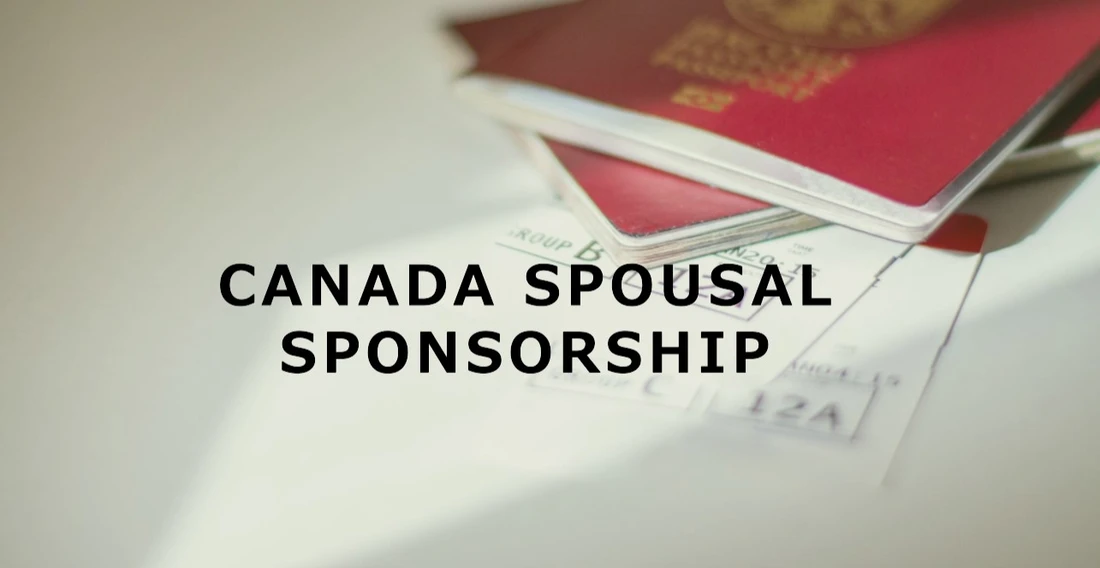Embarking on Canada’s Spousal Sponsorship has more than preferable and appealing features, but it has some little details that gesture some complex rules and facts. This program is beneficial to Canadian citizens or permanent residents with a provision to suggest a spouse or common-law partner for Canadian permanent residency. The knowledge of the eligibility criteria, including the requirement for a real marriage and the possession of required monetary means, is also essential. The process involves meticulous documentation and adherence to specific procedures to prove the legitimacy of the relationship.
Canada Spousal Sponsorship: Things To Know
Navigating through the sponsorship journey can lead to a rewarding outcome: building a life together in Canada’s diverse and welcoming environment. Check out the important things to know about Canada’s spousal sponsorship.
Who Can Sponsor a Spouse or Common Law Partner to Visit Canada?
To be a sponsor for a spouse or common-law partner of Canadian residency, it is necessary to be an adult Canadian citizen or permanent resident who can depend on himself/herself financially or have no will to accept Canadian government support. Sponsors need to undertake a general commitment that is a legal agreement to guarantee help for the spouse’s or partner’s food, clothes, shelter, and particular medical requirements not provided by the public service, while the definite time will be settled for. The obligations continue to be in force with citizenship status changes, relocation, break-up, or financial hardships. If a single person wants to financially support their spouse, their qualification for sponsorship can include maternity, parental, and sickness benefits under the Employment Insurance Act. However, not all government benefits that an individual receives will be considered as income for eligibility purposes.
What are the fees for applying to sponsor a spouse or common-law partner?
Applying to sponsor a spouse or common-law partner for Canadian immigration involves various fees totalling $1,135. This sum comprises the sponsorship fee, principal applicant processing fee, and the right of permanent residence fee, collectively amounting to $1,050, with an additional $85 for biometrics per person. While the permanent residence fee of $475 can be paid later, immigration authorities advise including it with the initial application to avoid delays. Quebec residents must pay an extra $301 to their provincial government, not to Immigration, Refugees and Citizenship Canada (IRCC).
To complete the payment process, applicants need a valid email, access to a printer for the receipt, and a payment method such as a credit card or debit MasterCard/Visa. Following payment, sponsors should print two copies of the receipt, attaching one to the application and keeping the other for records. Without these fees, the IRCC will not proceed with the application, returning any submissions lacking the necessary payments. However, in cases of overpayment, the IRCC issues refunds promptly. For assistance with the process, including understanding fee requirements, immigration lawyers in Mississauga can provide valuable guidance, ensuring applicants fulfill all financial obligations correctly.
What Biometric Information Will Be Needed?
For spousal or common-law partnerships, only biometric data is required for the sponsorship applications and this includes fingerprints and photographs. In this step, the candidate must visit the authorized biometric capture center in person. However, Canadian citizens and current permanent residents are not required to submit biometrics. In cases where the sponsored partner resides within Canada, they may visit a designated Service Canada office for this purpose. The biometric procedure is initiated only after the application and biometric fees have been paid, and the applicant has received a Biometric Instruction Letter (BIL). This letter, detailing where biometrics can be submitted, should prompt immediate action to prevent any application delays.
How long will the process of sponsoring my spouse or common-law partner take?
As per an estimate by the official Immigration, Refugees and Citizenship Canada (IRCC) website, sponsorship applications generally require about 12 months for processing. This window covers steps including the processing of biometric materials, assessment of the sponsor and the sponsored person, and the determination of the eligibility conditions. However, experiences shared by individuals on social media platforms like Twitter indicate that, in some cases, the process can extend significantly longer, with some reporting delays of up to four years.
5) What are the steps for obtaining and completing the Sponsorship Application Package and its forms?
To start a spousal or common-law partner sponsorship process, applicants need to first access an online application package. This would imply the processing of questions before the application of sponsored individuals concerning the place they currently reside and the documents needed for the application. The final step in the procedure is the checklist that comes with the package, used to collect all the necessary documents. These documents must be fully completed and signed to prevent delays caused by incomplete submissions.
Sponsors should follow the conditions stipulated by each nation to ensure the documents are translated correctly and that they are identifiable like birth certificates and other proofs of identification. Clarity and readability of all photocopies is an essential component. The certification is needed only for directly related activities (translation). The originals of documents are not sent unless IRCC (Immigration, Refugees, and Citizenship Canada) specifically requests them; and they won’t be returned.
Upon application approval, the photos supplied in the application will be used for the Permanent Resident Card. Sponsors are advised to complete forms electronically when possible, facilitating validation and ensuring all necessary information is provided. Every form must be signed in ink, confirming the sponsor’s commitment and accuracy of the information provided.
Can the spouse or common-law partner work or study in Canada once they arrive?
Upon arriving in Canada, spouses and common-law partners sponsored under the spousal or common-law partner sponsorship program may be eligible for an open work permit. This allows them to work or study while their permanent residency applications are under review. They can apply for the open work permit concurrently with their permanent residency application or at a later stage.
Those who already possess a valid work or study permit can continue their employment or education without interruption. It is illegal if you on the job or study without the proper work authorization from Immigration, Refugees, and Citizenship Canada (IRCC). For all who are willing to stay as students, the submission of an Application to Change my Conditions, Extend my Stay, or Remain in Canada as a Student has to be made. Through appropriate communication, the IRCC will alert people in writing once they qualify to apply for a study permit. With such an alert, the individuals are assured of their compliance with Canadian immigration laws.
Conclusion
The sponsorship of a spouse or a common-law partner in Canada involves knowing how to fit in all the intricacies of the process, fill out the right documents and avoid any possible delays. Every stage, from the application fee to biometric data gathering or work permit eligibility therefore rendering the process a successful passage. The sophistication level of immigration laws and the dynamics of time, and in light of powerful challenges such as COVID-19, puts immigration advice’s bottom line on a pedestal. Immigration lawyers in Ottawa are backed with the right knowledge, skills as well as experience that greatly help the applicants in putting their applications that cover all the required details in a precise and correct way. In most instances, their skills are an added value that draws a line between a successful application for immigration and an unachieved one.




